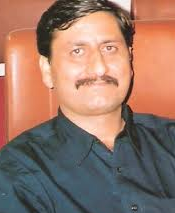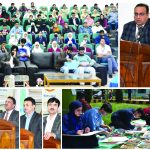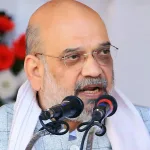FRAGRANCE OF IDEAS
A huge national debate has been unleashed consequent upon the exposition of questionable work, conduct, overtures and statements of the Judiciary in India and particularly the Supreme Court of India. Here we can also observe that a hate campaign against the sitting and retired judges of the High Courts and the Supreme Court of India has also evolved in the regular media and the social media.
It has brought into discussion issues that concern not only the politicians, judges, advocates, bureaucracy and the media but also the common citizens of the nation. It has also created a keen interest among the NRIs and the other India watchers throughout the world. Many people believe that an era of long desired introspection of the judiciary and especially the Apex Court has begun.
There were a number of incidents that took place over the last two decades and especially during the last one to two years that have brought the work and conduct of the judiciary into serious question. On the basis of its judgements, observations and even its overtures from time to time, the judiciary in the country has earned wrath, criticism, anguish and consequently even hate of the common masses.
Things can’t be brushed aside by the Supreme Court of India by taking a position that it possesses the powers via the constitution to determine what is right and what is wrong. The sole authority on issues pertaining to understanding, wisdom and sense of discrimination doesn’t lie only with the Apex Court of the country. Moreover, the highest court can’t expect people to have deep respect for them always and in all circumstances, in fact they need to earn it from their moral conduct and statements and also from their down to earth work and positive overtures.
Things as happened during the last six months in particular have disturbed the conscience of the nation in regard to the conduct of the judiciary especially the Supreme Court and the High Courts. The Vice President of India, Jagdeep Dhankad, who is himself an advocate of high repute and also a former Governor of West Bengal, raised the issue of transgression of powers in regard to the Supreme Court of India vis-a-vis the parliament and the assemblies of the states.
He in the capacity of the Chairman of the Rajya Sabha on the floor of the house said that the supremacy of the house can’t be challenged by the judiciary and especially by the Supreme Court of India. He went to an extent to ask the parliamentarians to stand united on the issue because the issue pertains to the powers of the house irrespective of the party denominations and other affiliations.
Dhankad was observed profusely expressive in context of the recent Supreme Court judgement that dictated a mandate to the President of India and the Governors of the states in regard to the pending Bills and Resolutions passed by respective legislatures with them. Though the constitution is silent on any kind of a mandate in this regard yet the Apex Court chose to take refuge under Article 142 of the constitution to lay out “instructions” to the constitutional head of the nation and the constitutional heads of the states. Justice (retd) Ajay Rastogi disagreed with the deadline set up by the Apex Court and said that there was no such mandate with the Supreme Court under Article 142 to advise or order the highest constitutional heads.
Similarly in respect of the Wakf Amendment Bill, the deliberations, argumentation and also the observations of the judges in the Court Room on 16-17 April, 2025 seemed very disturbing. The fact of the matter is that the three-judge bench of the Apex Court changed its stance only on the second day seeing the firm stand and the position of the government of India through its top law officer in the courtroom, Tushar Mehta, Solicitor General of India. Otherwise the judges were ready with the stay order well before the hearing of the case and exposed their biased mind-set openly and publicly. Dr. Nishikant Dubey, a four-time MP of the Lok Sabha from Jharkhand raised a great debate about the overreaching of the Supreme Court in case of the Wakf Bill.
Dubey was clearly categorical when he said that in case the finality of the law is to be decided by the Supreme Court of India, then what was the use of the two houses of parliament to enact it. “Let the whole issue be decided by two or three judges of the Supreme Court of India and let us close the parliament”, he said. His colleagues in parliament like Dinesh Sharma and Manan Kumar Mishra echoed his point of view. Dubey went to the extent to say that the Chief Justice of India is “responsible for civil wars in the country”. However, an overwhelming audience among the people of the nation have come out to express their support to Dubey on regular and social media which has opened a wide ranging public debate on the subject.
The nation is also disturbed with the judgement in regard to the case involving the rape of a girl. The judgement has earned a sharp reaction from the general public. The Allahabad High Court judgement delivered by Justice RMN Mishra is an absolute shame. On 17 March, he delivered a judgement in an alleged attempt to rape case of a minor girl by two perpetrators. The incident had occurred in 2021.
In the judgement, Justice Mishra noted that “the difference between preparation and actual attempt to commit an offence consists chiefly in the greater degree of determination.” In this case, he reasoned that the acts of grabbing the breasts of the minor, loosening her lower garment and trying to drag her beneath the culvert did not amount to an actual attempt to rape. However, on 25th March 2025, the judgement was stayed by the Apex Court observing huge reactions throughout the nation.
On March 14, 2025 incident of fire and alleged discovery of “sacks” of half-burnt currency notes from a storeroom on the residential premises of a senior Delhi High Court judge, Justice Yashwant Varma became a big news and spread like a wildfire. The judge was later stripped of his official duties and transferred to the Allahabad High Court. The Bar Association of Allahabad High Court passed a resolution to boycott the “corrupt judge”.
The Supreme Court of India was forced to appoint a three-member committee to investigate the matter and report, which the committee never did till date. The issue of the moral authority of the judiciary is questioned by incidents like these and the position of the judiciary so far as the accountability and the transparency is concerned is also dashed in the eyes of the general masses.
Here it needs to be explained in view of the “stand” taken by the judiciary in the current scenario in regard to its powers that there are four pillars of democracy. Three pillars are official and one is an unofficial pillar. The unofficial pillar is called the Media. The media has its real power enshrined in its right to express itself freely, criticize the government, formulate a perception and thus create a narrative. Though it has no executive power in its own hands, it has the capability to influence the executive to exercise its power effectively, honestly and with integrity.
The second pillar is called the Executive. It has all physical, visible and invisible instruments of power in its own hands and is thus greatly empowered to exercise its will, intent and the established protocol. Police, paramilitary forces, army, all wings of governmental infrastructure including manpower and machines remain in its judicious control all the time. However, the two eyes that control the Executive are Legislature and the Judiciary. All its actions are subject to the permission and scrutiny of the other two important pillars in order to maintain a check and balance of power.
The third pillar comprises the legislatures spread throughout the country in the form of the parliament and the Assemblies of the states. The power of the legislature is two folded viz, that the legislature is elected by the votes of the public and it represents the will of the people. The second instrument of power it holds is that it has permission under the constitution to make laws, rules and also it can make amendments in the constitution. These two powers of the legislature make it the superior most out of all the four pillars of our democracy.
The last pillar called judiciary is also having two strong power centres within its fold. One is that it has the expressed authority to review laws and judgements and pronounce new and improved final judgements within the four walls of the constitution. The second power flows from its work, conduct, statements, overtures and body language both within and outside the court.
The moral authority of the judiciary is its most cherished power and while executing its powers, it has more to rely on its moral standing in the eyes of the public that reinforces its constitutional power to pronounce judgements. People believe and have developed a faith that after the gods, it is the judge sitting in his/her chair in the courtroom who is a god-incarnate. This particular sentiment about the judiciary in the eyes of the public is unfortunately shattered as on date and thus this national debate and discourse has taken birth.
Harish Salve, a senior advocate and a legal luminary added one more dimension to the discussion. He said a couple of days back that after 2014, he had maintained that the Indian judiciary will be misused by the forces inimical to peace to destabilize the government. The other dimension is that the socio-politico-cultural scenario of the nation is surely changing and has made an impact on the three pillars of democracy in India sans the judiciary over the last a decade. The question remains whether the Indian judiciary is fighting the last battle in this war..!
The Supreme Court of India and its “My lords” will have to come up with the relevant answers as soon as possible to the satisfaction of the people at large.
(The author is a senior BJP & KP leader, human rights defender, author & columnist and can be reached at [email protected])








